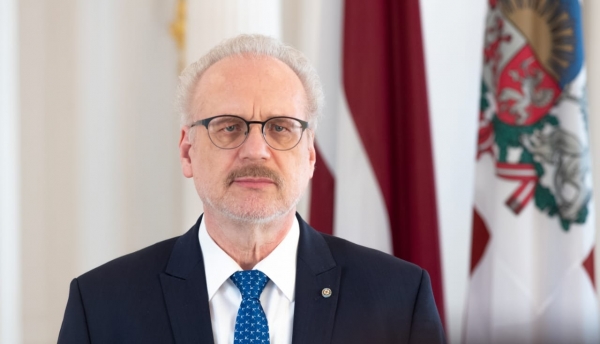Caspian Energy (CE): Mr. Levits, how would you assess the results of the visit made to Azerbaijan early in March?
Egils Levits, Fmr. President of the Republic of Latvia: Latvia and Azerbaijan have built stable bilateral ties and Latvia is keen to continue political dialogue on all levels. Local governments in both countries have already signed 14 different cooperation agreements, while Latvia and Azerbaijan will mark the 30th anniversary of diplomatic relations in 2024. Economic relations between Latvia and Azerbaijan have been on the rise in recent years. We are ready to discuss deeper cooperation in areas such as information and communications technologies, smart energy and green technologies. Transport and logistics are another sector. Azerbaijan is key for EU’s efforts to diversify natural gas suppliers and routes, thereby strengthening Europe’s energy independence. We would like to expand this cooperation to renewables.
Latvia is one of those NATO member states that support ever closer cooperation between the Alliance and Azerbaijan in scope of the Partnership for Peace initiative. It is committed to keep Latvian embassy in Baku as the Allied contact point embassy until 2024.
Latvia is ready to contribute to stronger international organisations and rules-based international order – a goal that could be pursued more successfully together with Azerbaijan, and in the build-up to Latvia’s candidature to the UN Security Council in 2025.
CE: What are your impressions of the 10th Global Baku Forum held with your participation?
Egils Levits: It was an honour and great pleasure to participate at the opening of the 10th Baku Global Forum in the spring of 2023. In times when the world is changing rapidly and so unpredictably, we need truly global dialogue. The insights of current and former leaders assembled at the Baku Global forum are founded on real experience.
I was especially glad to hear the growing support for the establishment of an ad hoc international tribunal to try Russia for the crime of aggression against Ukraine. It is of utmost importance that the international community responds to such a grave attack on the international rules-based order, embodied in the UN Charter since 1945.
This was my message also when introducing the discussion on how to foster resilience in the face of multiple crises and threats to security of both states and individuals.
CE: Cooperation in which sectors of the economy promotes the establishment of much closer relations between our countries?
Egils Levits: Historically the Latvian companies have been strong in exporting to Azerbaijan products from the traditional sectors of agriculture, food and pharmaceuticals. However, we would like to add value to our trade relations in Azerbaijan by offering Latvian smart city, green technology and logistics solutions.
For Azerbaijan companies it is important to know that we are in the centre of the innovative North European region, and we can become gateway to European single market for your companies.
During the recent visit the Director General of the Investment and Development Agency of Latvia, Kaspars Rožkalns, signed the Memorandum of Understanding with its counterpart – the Export and Investment Promotion Agency of the Republic of Azerbaijan. The main cooperation areas outlined in the memorandum are bioeconomy, digitalization and biomedicine, with a special emphasis on pharmaceutics. Transport and logistics are an area where we see cooperation increasing. In May 2023, Latvian national airline airBaltic restarted direct flights between Riga and Baku, helping not only businesspeople to travel but allowing tourism to increase once again.
CE: Could you please tell us about trends registered in the field of economic relations of both states?
Egils Levits: After the global COVID-19 pandemic and the supply chain disruptions that followed, Russia’s aggressive war in Ukraine has destabilized international trade. However, the trade volumes between our countries indicate growth and there are planned activities in the future, which can accelerate our economic cooperation.
For example, the Latvian Chamber of Commerce and Industry with their Estonian and Finnish partners are engaged within the “LEF network to Azerbaijan” project. This project will be a good opportunity for Azerbaijan companies to make new contacts with the Baltic-Nordic region countries. For the next three years the plans of this project include mutual trade missions and business events.
CE: Azerbaijan is contributing to the energy security of the European Union. What are the prospects of cooperation between EU and Azerbaijan in the area of renewable energy?
Egils Levits: The current geopolitical situation pushes us to work harder towards energy transition and reaching global climate goals by reducing the dependency on fossil resources. We know that in addition to Azerbaijan’s already existing thermal and hydro power plants, there is a huge potential for the wind energy generation from the Caspian Sea.
Similarly, in Latvia we have plans to develop more onshore wind farms, as well as offshore wind energy capacity from the Baltic Sea.
We support the EU–Azerbaijan Memorandum of Understanding on Cooperation in the field of energy. We are also glad to hear about the recent visit of the Commissioner for Energy, Kadri Simson, to Azerbaijan and that the future cooperation in renewable energy exports to the EU were discussed.
During my visit, Latvian entrepreneurs visited the hybrid (solar and wind) alternative energy station in Gobustan, and Latvia would like to see Azerbaijan succeed in harnessing the potential of renewable in power generation.
The EU and its companies could help with our know-how, technology and private investments. In order to ensure the conditions for rapidly scaling up renewable energy generation capacity investment, we would encourage Azerbaijan to proceed with an effective auction regime for renewable energy on the back of the state-of-the-art framework that has been developed with the technical assistance provided by the EBRD.
Thank you for the interview





